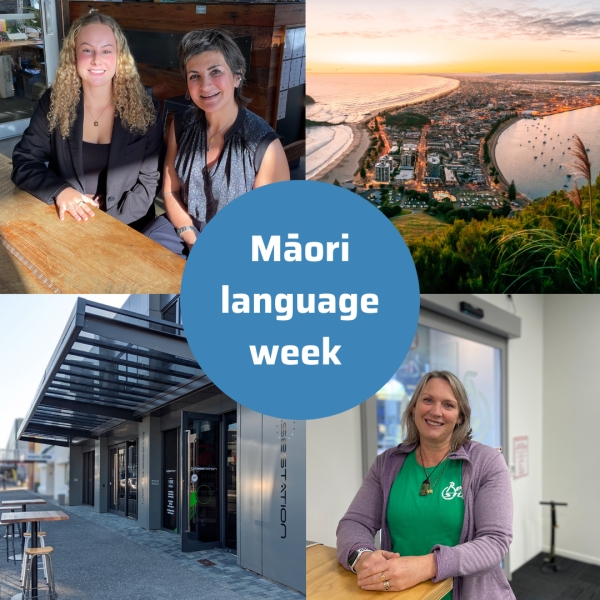What does te reo Māori mean to you?
Manaia: My connection to Te Reo Māori is through my dad’s whāna, so it’s half of me! Te Reo is important to me, my Te Reo is pretty good and I use it every day. It wasn’t until I worked in the US I realised how much I used it - I'd used the odd word in a sentence and people had no idea what I was saying!
Erin: For me, Te Reo Māori is the language of Māori, it’s important to Aotearoa, NZ and I think that we should all learn at least the basics. It’s important to embrace and celebrate Te Reo. I know sometimes it’s hard and we have difficulties with pronunciation, but I think it's more important to try than not. One of the things I love about Te Reo is there are a lot of words that don’t directly translate into English, which I feel illustrates the uniqueness of the language.
Pascale: To me, there is no excuse not to be interested in Te Reo these days, it has never been more accessible and available. Te Reo is the door of entry to Te Ao Māori (Māori worldview). Te Reo is all over my worklife, and thanks to that I am learning new words every day! Being a French person in Aotearoa, I'm not always confident with my pronunciation though! Having been a French teacher, I also understand you cannot separate language and culture, and I love nothing more that listening to Moana radio or tuning in Te Karere to see these work together on the daily.
Where and how have you learnt Te Reo Maori?
Manaia: I just grew up with it, my dad used it a bit when we were young and learning words. He’s not fluent, and nor are his parents as they were brought up in an era where you were punished for speaking Te Reo. I also studied Te Reo at high school.
Erin: Growing up in Aotearoa, Te Reo is something that was around us. A few years ago I made a conscious decision to greet everyone at work in Te Reo. Last year I enrolled on a Te Reo course run at Basestation - it was great, we learned how to do a pepeha, some Māori tikanga and some basic Te Reo language skills.
Pascale: The starting point for me was when I moved to Aoteraroa to be a teacher, Te Reo was all part of the new experience of moving to a new country. Over the years, my work with young people has opened wonderful opportunities to work alongside Mana Whenua. I’ve been curious to seek out and understand more. When we started the Te Reo classes, I surprised myself when I realised I knew over 100 Māori words, absorbed through work and listening even passively to TV programmes. Long way to go though!
Last year Pascale organised Te Reo classes at Basestation. Eleven residents and friends of Basestation signed up. The two-hour long classes were an introduction to Te Reo and Tikanga for ten weeks and we'd love to do that again!
What changes have you seen in Aotearoa regarding acknowledgement and attitude to Te Reo Māori?
Manaia: When I look back at what my dad and his parents, my grandparents, experienced with their Te Reo it wasn’t good. They were punished for speaking their own language. There’s been a bit of a revival for my generation, especially with it being taught at schools. But, lately, with the current political climate, I think it’s in danger of losing momentum.
Erin: Back in my grandparents and parents day, Māori weren’t allowed to speak their language. There have been recent TV documentaries showing the discrimination against Māori. For my generation - we didn’t realise the inherent and ingrained racism that had gone on back then, but today people are more educated. I see kiwis embracing Te Reo more, for example, I feel people make more of an effort to correctly pronounce place names, Tauranga is no longer pronounced ‘towel-Wronger’! It’s been great to see business and government departments embracing Te Reo, seeing government departments changing their names, although some have changed them back sadly. I believe we’ve come a long way from trying to eliminate the language to now, it’s a normal part of our language. Māori words are commonly spoken; we talk about doing the “mahi”, we say “kia ora” - it’s a beautiful thing!
Pascale: In the twenty five years I've been in Aotearoa, I think there has been a big change in the acknowledgement of and attitudes towards Te Reo. When I first came to Tauranga, I had no understanding of the relationship between the indigenous population here and the rest of the people in NZ. This has changed over the years and my experience of Tikanga, Te Reo and Te Ao Māori has taken its current shape, which is work in progress. There are also more conversations around the weight of colonisation and the trauma it causes, led by Mana Whenua and I am grateful to Instagram and amazing accounts there that really show the behind the scenes. I also love being around young people proudly exchanging in full Te Reo. No matter the challenges thrown at sovereignty and revival by this current Government, there is a groundswell of new beginnings shaping up nicely out here in our communities

